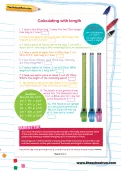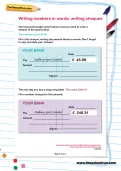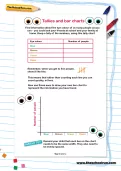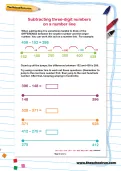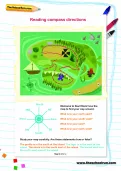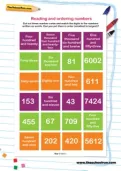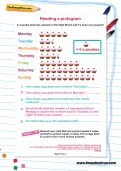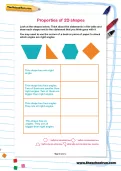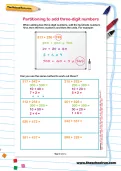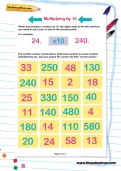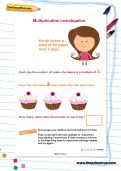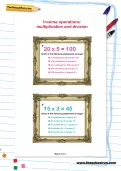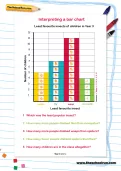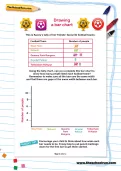You have just bought some trainers and you need to write a cheque to the sports shop. The trainers cost £45.99. Fill in this cheque, writing the amount above in words. Don’t forget to sign and date your cheque!
or
Register to add to your saved resources
Already a subscriber? to view this content.
Can you write each of these numbers as words? Remember, when you are writing numbers in full, hyphenate all numbers between 21 and 99.
or
Register to add to your saved resources
Already a subscriber? to view this content.
Our Venn diagram worksheet is a handy resource created to assist KS2 children in fully understanding the concept of Venn diagrams. It is a teacher-created tool that will help your child go through the process of organising data using Venn diagrams.
or
Register to add to your saved resources
Already a subscriber? to view this content.
Mark has worked out the answers to these calculations, Look through and estimate what you think the answers should be. Afterwards, use a calculator to check whether Mark’s answers were correct.
or
Register to add to your saved resources
Already a subscriber? to view this content.
Find information about the eye colour of as many people as you can – you could ask your friends at school and your family at home. Keep a tally of the numbers, using this tally chart. Now draw your own bar chart to represent the information you have found.
or
Register to add to your saved resources
Already a subscriber? to view this content.
When subtracting it is sometimes helpful to think of the DIFFERENCE between the smaller number and the larger number. You can work this out on a number line. Try using a number line to work out these questions.
or
Register to add to your saved resources
Already a subscriber? to view this content.
Carroll diagrams help us group things according to a yes/no system. Do the things you’re organising have a particular feature (yes!) or not (no!)? Can you sort these shapes into the Carroll diagram below?
or
Register to add to your saved resources
Already a subscriber? to view this content.
Welcome to Skull Rock! Use the map to find your way around. Can you read the compass directions and answer these questions?
or
Register to add to your saved resources
Already a subscriber? to view this content.
Cut out these number cards and match the digits to the numbers written as words. Can you put them in order (smallest to largest)?
or
Register to add to your saved resources
Already a subscriber? to view this content.
This KS1 pictogram worksheet will help your child read pictograms and understand how to use them in their maths classes. It was created by an experienced teacher with the aim of supporting your child's learning at home.
or
Register to add to your saved resources
Look at these shapes. Think about the statements in the table and draw each shape next to the statement that you think goes with it. You may need to use the corner of a book or piece of paper to check which angles are right angles.
or
Register to add to your saved resources
Already a subscriber? to view this content.
When adding two three-digit numbers, add the hundreds numbers first, then the tens numbers and then the units. Can you use this method to work out these problems?
or
Register to add to your saved resources
Already a subscriber? to view this content.
Some numbers are missing from these lily pads. Look at the other numbers and see if you can work out what they are.
or
Register to add to your saved resources
Already a subscriber? to view this content.
Count in 3s from 3 to 36. Write down each number as you go. Now go through and add up the digits of each number. What do you notice?
or
Register to add to your saved resources
Already a subscriber? to view this content.
Here's a method to help you multiply multiples of ten (numbers ending in zero). Can you use this method to help you answer the following questions?
or
Register to add to your saved resources
Already a subscriber? to view this content.
Cut out the number cards below. Each blue number is a pink number multiplied by ten. Can you match the cards into their correct pairs? Remember, when you multiply a number by 10, the digits slide to the left and then you need to put a zero in before the decimal point.
or
Register to add to your saved resources
Already a subscriber? to view this content.
How well do you know the 3x table? Use your multiplication skills to work out how many cakes Sarah has baked.
or
Register to add to your saved resources
Already a subscriber? to view this content.
Get your thinking hats on and see if you can work out which of the following multiplication and division statements are true.
or
Register to add to your saved resources
Already a subscriber? to view this content.
Can you read the data on this bar chart to find out about the least favourite insects of children in Year 3?
or
Register to add to your saved resources
Already a subscriber? to view this content.
Using the tally chart, can you complete this bar chart to show how many people liked each football team? Remember to make sure all the bars are the same width and that there are gaps of the same width between each bar.
or
Register to add to your saved resources
Already a subscriber? to view this content.
